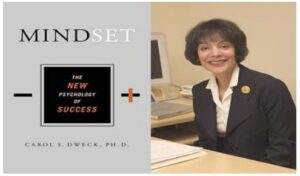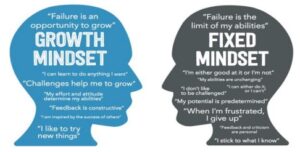CRITICAL ROLE OF MINDSET IN PEAK PERFORMANCE

Mindset plays a critical role in achieving peak performance. A person’s mindset is the lens through which one views the world, influencing how one interprets events and responds to challenges. As a result, many experts believe that mindset is one of the essential factors in achieving success.
For instance, John, a 30-year-old man, had been struggling with his career and personal life. John had always been a negative thinker, constantly doubting his abilities and fearing failure. He habitually blamed others for his problems and never took responsibility for his actions.

One day, John met an old friend who had turned his life around and had become a successful entrepreneur. The friend shared his story with John and how he had changed his mindset to cultivate positivity and a can-do attitude. His friend’s story inspired John, and he changed his life.
John started by setting small achievable goals for himself and celebrating every little success. He learned to be grateful for what he had and stopped comparing himself to others. Instead of complaining about his problems, he started focusing on finding solutions to them.
John also started surrounding himself with positive people who supported him and encouraged him to keep going. He began to read self-help books, listen to motivational speakers, and attend personal development workshops.

With his new mindset, John could land a job in his desired field, and within a few months, he was promoted to a managerial position. He also met the love of his life, and they got married.
John’s success story did not stop there. He started his own business, which became a huge success. He attributed his success to changing his mindset and cultivating a positive attitude.
John’s journey teaches us that changing our mindset and cultivating a positive attitude can lead to great success in our personal and professional lives. It takes time and effort, but it is worth it. We can achieve anything we set our minds to with a positive mindset.

Henry Ford’s famous quote, “Whether you think you can, or you think you can’t – you’re right,” highlights the importance of mindset in achieving success. It suggests that our beliefs and attitudes have a powerful impact on our ability to achieve our goals and realise our potential.
In the context of mindset, this quote emphasises the power of self-belief. If we believe in our ability to succeed, we are more likely to act towards our goals, persist in facing challenges, and ultimately achieve success. Conversely, if we doubt our abilities or believe we cannot achieve our goals, we are more likely to give up or not even try.
This quote also suggests that our mindset can be a self-fulfilling prophecy. If we believe we can succeed, we are more likely to put in the effort and take the necessary actions to achieve our goals. On the other hand, if we believe that we can’t succeed, we are more likely to hold back, make excuses, and ultimately fail.
This quote highlights the importance of cultivating a positive and growth-oriented mindset. By believing in ourselves and our ability to achieve our goals, we can overcome obstacles, push past our limits, and reach our full potential. Our mindset is critical in determining our success, and we can shape it through our thoughts, beliefs, and attitudes.

The power of mindset cannot be underestimated when it comes to achieving peak performance. One’s mindset and belief system significantly impact sports, academics, or business performance. In this article, we will explore the concept of mindset and how it influences performance, the difference between fixed and growth mindsets, and how to cultivate a growth mindset to achieve peak performance.
Mindset refers to individuals’ beliefs and attitudes about their abilities and potential. It is a fundamental aspect of human psychology that can determine how we approach challenges and obstacles.

One Bollywood movie that comes to my mind where the hero achieves success by changing his mindset is the 2008 film “Rock On.”. The movie stars Farhan Akhtar as Aditya Shroff, a former rockstar who gave up music after a bitter fallout with his bandmates. Aditya now leads a mundane life as a banker, but he is still haunted by his past and the unfinished dreams of his band, Magik.
One day, Aditya meets an old friend, Joe Mascarenhas (played by Arjun Rampal), who is still a successful musician. Joe encourages Aditya to revive Magik and fulfil their dream of winning a music competition. At first, Aditya is reluctant, but after a series of events, he realises he cannot let go of his passion for music and decides to give it another shot. However, Aditya faces several challenges as he tries to reunite with his bandmates, who have moved on with their lives. He also must confront his inner demons, including his fear of failure and inability to forgive his bandmates for betraying him in the past.
Throughout the movie, Aditya transforms as he learns to let go of his past and embrace his passion for music. He changes his mindset from defeated and bitter to determined and optimistic, driven by his love for music. With the support of his bandmates and his wife, played by Prachi Desai, Aditya works hard to prepare for the music competition. They face tough competition, but ultimately, they win and achieve their dream of making a successful comeback as a band. “Rock On.” is a movie that showcases the power of changing one’s mindset and following one’s passion. Aditya’s journey from a disillusioned and bitter person to a confident and optimistic musician inspires anyone who wants to achieve their dreams.
Here are some reasons why mindset is essential for peak performance:
Motivation: A positive mindset can help you stay motivated and focused on your goals. It can also help you overcome obstacles and setbacks, inevitable in any pursuit of excellence. With a growth mindset, you are more likely to see challenges as opportunities for growth and learning rather than as threats or barriers.
Confidence: Confidence is a critical component of peak performance. A strong mindset can help you build confidence in your abilities, essential for taking risks, pushing past your comfort zone, and achieving your goals. Believing in yourself makes you more likely to take on challenges and perform at your best.
Resilience: Resilience is the ability to bounce back from setbacks and keep moving forward. A resilient mindset can help you weather the ups and downs of life and stay focused on your goals. With a growth mindset, you are more likely to see setbacks as temporary and learn from them rather than giving up or becoming discouraged.
Focus: A positive mindset can help you stay focused and avoid distractions. When you have a clear vision of what you want to achieve and believe you can do it, you are less likely to be sidetracked by negative thoughts or external distractions. A focused mindset is essential for achieving peak performance in any area of life.

Carol S. Dweck’s book, “Mindset: The New Psychology of Success,” is a groundbreaking work that explores the impact of mindset on success. The book is based on years of research and provides insights into how our mindset can help or hinder our ability to achieve our goals.
Dweck identifies two types of mindsets – fixed mindset and growth mindset. Fixed mindset individuals believe that their abilities and intelligence are predetermined and cannot be changed. They tend to avoid challenges, give up quickly, and feel threatened by the success of others. In contrast, growth mindset individuals believe that their abilities and intelligence can be developed through hard work and dedication. They embrace challenges, persist in the face of setbacks, and view the success of others as inspiration for their growth and development.
Dweck’s book explores how mindset impacts different areas of our lives, including relationships, parenting, business, and education. She provides real-world examples and practical advice on cultivating a growth mindset and overcoming the limitations of a fixed mindset.

Changing one’s mindset is challenging, as it requires a conscious effort to shift one’s perspective and thought patterns. However, w, changing your mindset and developing a more positive and growth- oriented outlook is possible with dedication and persistence.
Here are some steps you can take to change your mindset:

Identify limiting beliefs: The first step in changing your mindset is identifying the beliefs and thinks patterns holding you back. These may be negative self-talk, limiting beliefs, or fixed mindsets that prevent you from seeing opportunities and growth.
Challenge negative thoughts: Once you have identified your limiting beliefs, challenge them by asking yourself if they are true. Are they based on facts, or are they assumptions or fears? Replace negative thoughts with positive affirmations and focus on solutions instead of problems.
Cultivate a growth mindset: A growth mindset believes one’s abilities can be developed through hard work and dedication. Focus on your strengths and seek out opportunities to learn and grow. Embrace challenges as opportunities for growth and view failures as learning experiences.
Practice mindfulness: Mindfulness is the practice of being present and fully engaged in the current moment. Focusing on the present can reduce anxiety and negative thoughts and develop a more positive and grateful outlook.
Surround yourself with positive influences: Surround yourself with people who support and encourage your growth and a positive mindset. Seek mentors and role models who embody the mindset you want to develop.
Take action: Finally, take action towards your goals and practice your new mindset daily. Set small achievable goals and celebrate your progress along the way. Remember that changing your mindset is a process, and it takes time and effort to develop new habits and ways of thinking.
In conclusion, changing your mindset requires a conscious effort and a commitment to developing a more positive and growth-oriented outlook. By identifying limiting beliefs, challenging negative thoughts, cultivating a growth mindset, practising mindfulness, surrounding yourself with positive influences, and taking action, you can shift your perspective and achieve your full potential.
Peter Diamandis is an entrepreneur, author, and futurist who is known for his work in the fields of innovation and technology. He has developed several mindsets that he believes are crucial for success in these fields, including the abundance mindset, exponential mindset, moonshot mindset, and longevity mindset. Let’s take a closer look at each of these mindsets:

Abundance Mindset: This mindset is based on the belief that there is enough abundance in the world for everyone to succeed. Rather than operating from a scarcity mentality, where we believe that resources are limited and must be hoarded, the abundance mindset encourages us to embrace collaboration and seek win-win opportunities. This mindset can be constructive for entrepreneurs and innovators looking to create new solutions and disrupt existing industries.
Exponential Mindset: The exponential mindset is based on recognising that technology is advancing at an accelerating pace and that this change will continue to increase. Those who embrace the exponential mindset can see opportunities where others see challenges, and they are willing to take risks and pursue ambitious goals. This mindset is particularly relevant in artificial intelligence, biotechnology, and robotics.
Moonshot Mindset: The moonshot mindset is about setting ambitious, audacious goals that inspire and motivate us to work towards a better future. Moonshots are typically big, bold ideas that must still be feasible with current technology or knowledge. By pursuing moonshots, we can drive innovation and create solutions that have a transformative impact on society. This mindset can be seen in companies like Google, which has pursued moonshots like self-driving cars and smart contact lenses.
Longevity Mindset: The longevity mindset is based on the belief that we can use technology to increase our lifespan and improve our healthspan. Those who embrace this mindset are focused on creating solutions that help us live longer, healthier lives. This mindset is particularly relevant in regenerative medicine, anti-ageing, and personalised health.
Overall, these mindsets developed by Peter Diamandis are designed to help entrepreneurs and innovators navigate the rapidly changing world of technology and create solutions that have a transformative impact on society. By embracing these mindsets, we can shift our perspective, take risks, and pursue ambitious goals that drive innovation and create a better future.
In conclusion, mindset is a crucial factor in achieving peak performance. A positive and growth-oriented mindset can help you stay motivated, build confidence, develop resilience, and focus on your goals. By cultivating a strong mindset, you can overcome obstacles, push past your limits, and achieve your full potential.
 Dr K. Jayanth Murali is a retired IPS officer and a Life Coach. He is the author of four books, including the best-selling 42 Mondays. He is passionate about painting, farming, and long-distance running. He has run several marathons and has two entries in the Asian book of Records in full and half marathon categories. He lives with his family in Chennai, India. When he is not running, he is either writing or chilling with a book.
Dr K. Jayanth Murali is a retired IPS officer and a Life Coach. He is the author of four books, including the best-selling 42 Mondays. He is passionate about painting, farming, and long-distance running. He has run several marathons and has two entries in the Asian book of Records in full and half marathon categories. He lives with his family in Chennai, India. When he is not running, he is either writing or chilling with a book.
